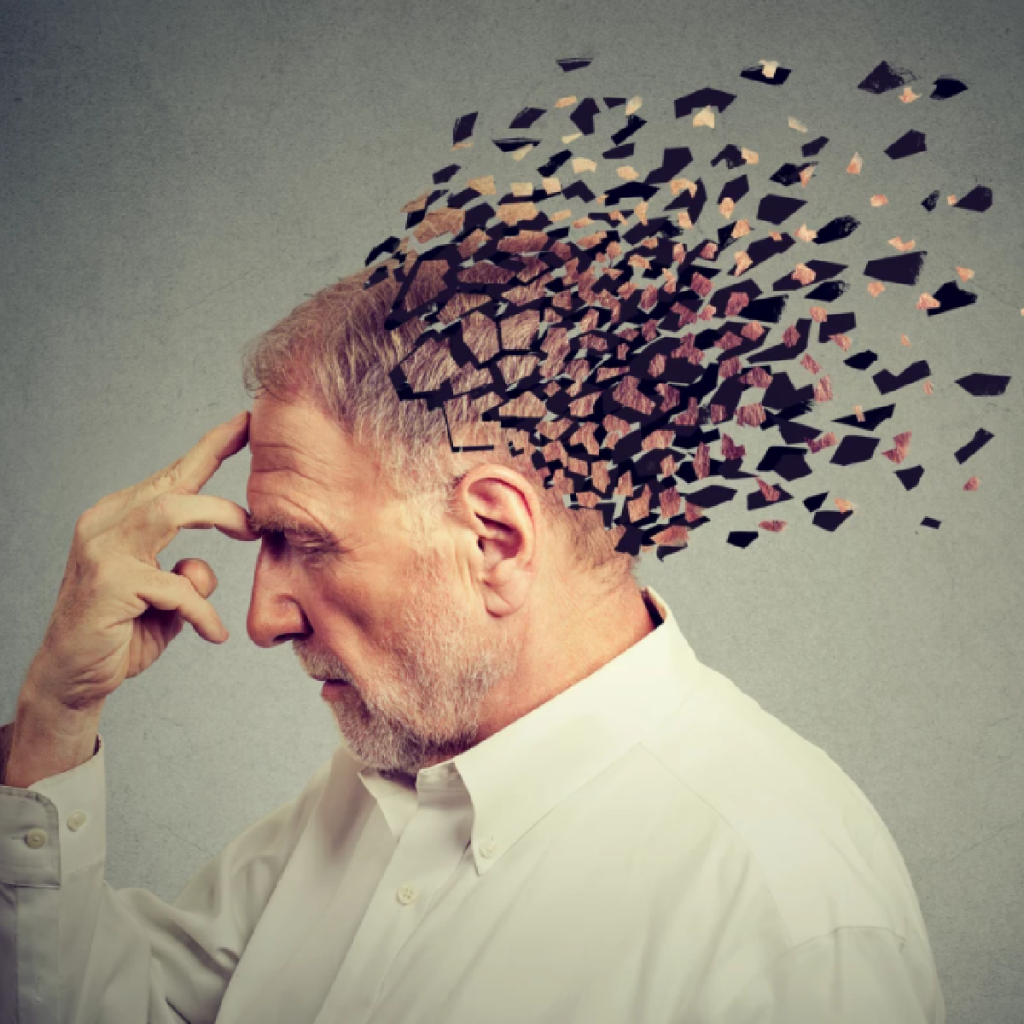Learn how to distinguish between normal memory loss and dementia in this informative article.
Understanding the Difference Between Normal Memory Loss and Dementia
Memory loss is a common occurrence and a normal part of the aging process. However, there are situations when memory loss becomes more significant and raises concerns about the possibility of dementia. In this article, we will delve into the intricacies of memory loss and dementia, exploring their definitions, the aging process, key differences between them, risk factors for dementia, and the diagnostic process involved.

Defining Memory Loss and Dementia
So, what exactly is memory loss? It is the occasional forgetfulness we experience, like misplacing car keys or forgetting someone’s name temporarily. However, memory loss can also be a source of frustration and anxiety for individuals who experience it more frequently. It can disrupt daily routines and make it challenging to recall important information.
On the other hand, dementia goes beyond the occasional forgetfulness and involves a decline in cognitive abilities that interferes with daily life. It affects a person’s memory, thinking, and behavior. Imagine waking up one day and struggling to remember your loved ones’ names, forgetting how to perform simple tasks like tying your shoelaces, or getting lost in familiar places. These are just a few examples of how dementia can profoundly impact an individual’s life.
Dementia, often associated with aging, is not a normal part of getting older. It is a syndrome caused by various diseases and conditions that damage brain cells. The most common cause of dementia is Alzheimer’s disease, accounting for around 60-80% of cases. Alzheimer’s disease is a progressive brain disorder that affects memory, thinking, and behavior. It slowly destroys brain cells, leading to a decline in cognitive function over time.
In addition to Alzheimer’s disease, there are other causes of dementia. Vascular dementia occurs when there is a disruption in blood supply to the brain, leading to brain cell damage. This can happen as a result of a stroke or other conditions that affect blood vessels in the brain. Lewy body dementia is another form of dementia characterized by the presence of abnormal protein deposits, called Lewy bodies, in the brain. This condition can cause a range of symptoms, including visual hallucinations and problems with movement. Frontotemporal dementia, on the other hand, is a type of dementia that primarily affects the front and sides of the brain, leading to changes in behavior, personality, and language.
It is important to note that while these are some of the most common causes of dementia, there are other less common causes as well. Some of these include Parkinson’s disease, Huntington’s disease, and Creutzfeldt-Jakob disease. Each of these conditions has its own unique set of symptoms and progression.
Understanding the different causes of dementia is crucial for accurate diagnosis and appropriate management. While there is currently no cure for most types of dementia, early detection and intervention can help improve the quality of life for individuals living with dementia and their caregivers. Research into the causes and treatment of dementia continues, offering hope for future advancements in care and support.
The Aging Process and Memory
As we age, it is natural for our memory to undergo some changes. Normal memory changes with age include occasional forgetfulness, like forgetting where we placed our glasses or struggling to recall someone’s phone number. These memory glitches are often minor and do not affect our daily functioning.
But let’s delve deeper into the fascinating world of memory and aging. Did you know that our brain’s ability to form new memories and retrieve old ones can be influenced by various factors? One such factor is the gradual decline in the size of the hippocampus, a region of the brain crucial for memory consolidation. This shrinkage is a normal part of the aging process and can contribute to some memory difficulties.
Furthermore, research has shown that changes in the brain’s communication networks can also impact memory as we age. The connections between different brain regions may become less efficient, affecting our ability to recall information quickly and accurately. This phenomenon is known as cognitive slowing and is a common experience for many older adults.
Interestingly, the aging process not only affects our memory but also influences how we perceive and process information. As we grow older, our attention span may decrease, making it harder to concentrate on complex tasks or filter out distractions. This can make it more challenging to encode new information into memory effectively.
While these age-related changes in memory and cognition are a normal part of getting older, it is important to distinguish between normal memory decline and more severe cognitive impairment. When memory loss becomes more frequent and starts interfering with our ability to complete tasks or remember important information, it can be a red flag for possible dementia.
Dementia is a broad term that encompasses various neurodegenerative disorders, such as Alzheimer’s disease. These conditions can cause significant memory loss, confusion, and difficulties with language and problem-solving. It is crucial to seek medical advice if you or a loved one experience persistent and worsening memory problems.
Fortunately, there are ways to maintain and enhance memory as we age. Engaging in regular physical exercise, maintaining a healthy diet, and staying mentally active through activities like reading, puzzles, and social interactions can all contribute to brain health. Additionally, getting enough quality sleep and managing stress levels are essential for optimal cognitive function.
So, while it is normal for our memory to undergo some changes as we age, it is important to stay proactive in taking care of our brain health. By understanding the aging process and implementing healthy lifestyle choices, we can support our memory and overall cognitive well-being for years to come.
Key Differences Between Normal Memory Loss and Dementia
Spotting the difference between normal memory loss and dementia can be tricky. However, there are some key distinctions to keep in mind.
When it comes to memory, our brains are complex and intricate organs that can sometimes experience hiccups. It’s not uncommon to forget where we put our keys or struggle to recall someone’s name. These instances of forgetfulness are often temporary and occur sporadically. We may rack our brains for a few moments, but eventually, the information we seek comes back to us like a light bulb illuminating a dark room.
On the other hand, dementia presents memory loss in a more severe and progressive manner. It goes beyond the occasional lapse in memory and delves into a realm where significant life events become forgotten, and learning new information becomes a challenge. Imagine a book with pages ripped out, leaving gaps in the story of one’s life. This is the reality for individuals with dementia.
Symptoms Comparison
In normal memory loss, forgetfulness is typically temporary and occurs sporadically. We may struggle to remember names or find words, but they eventually come back to us. It’s like misplacing a puzzle piece and then discovering it tucked away in an unexpected place. The relief and satisfaction of finding that missing piece are akin to the joy of remembering something we thought was lost.
With dementia, however, memory loss is more severe and progressive. It’s as if the puzzle pieces are slowly disappearing, leaving an incomplete picture. The ability to recall significant life events becomes a distant memory, like a faded photograph tucked away in a dusty old album. Learning new information becomes an uphill battle, with the mind struggling to retain the knowledge that was once easily absorbed.
Another distinguishing factor is the tendency to repeat the same questions. In normal memory loss, we may occasionally ask a question twice due to a momentary lapse in memory. However, in dementia, the repetition becomes a hallmark. It’s like a broken record playing the same tune over and over again, unaware that it’s stuck in a loop.
Progression and Long-Term Impact
Normal memory changes typically progress slowly and do not significantly impact daily life. It’s like a gentle breeze blowing through the trees, subtly reminding us of the passing of time. We may notice a slight decline in our ability to remember certain things, but it doesn’t hinder our overall functioning. We adapt and find ways to compensate for these minor memory lapses.
Conversely, dementia tends to worsen over time, gradually affecting various cognitive functions beyond memory. It’s like a storm brewing on the horizon, slowly gaining strength and intensity. As the storm rages on, it impacts personal relationships, work performance, and overall quality of life. The once vibrant colors of life become muted, and the world feels like a foggy haze.
It’s important to recognize and understand the differences between normal memory loss and dementia. While forgetfulness is a natural part of life, dementia is a condition that requires support and care. By being aware of the symptoms and progression, we can provide the necessary help and compassion to those affected by this challenging condition.
Risk Factors for Dementia
While age is the greatest risk factor for dementia, it does not mean that everyone will develop it as they get older. There are additional risk factors that can increase the likelihood of developing dementia.
As we delve deeper into the topic of risk factors for dementia, it is important to understand that it is not solely determined by age. While advancing years do increase the chances of developing dementia, there are other factors at play as well. Let’s explore some of these factors in more detail.
Genetic Factors
Having a family history of dementia, particularly with first-degree relatives like parents or siblings, can increase the risk of developing dementia. The influence of genetics on dementia risk is a complex interplay between inherited genes and environmental factors. However, it is important to remember that genetics is only a piece of the puzzle, and many individuals with no family history develop dementia.
Researchers have identified several genes that may contribute to the development of dementia, such as the APOE gene. Variations in this gene have been associated with an increased risk of developing Alzheimer’s disease, the most common form of dementia. However, it is important to note that having these gene variations does not guarantee the development of dementia. Other factors, such as lifestyle and environmental influences, also play a significant role.
Lifestyle and Environmental Factors
Our lifestyle choices and the environment we live in can also influence our risk of developing dementia. Factors such as high blood pressure, smoking, physical inactivity, obesity, and social isolation can contribute to an increased risk.
Let’s take a closer look at these lifestyle and environmental factors. High blood pressure, for example, can damage blood vessels in the brain, leading to cognitive decline. Smoking, on the other hand, exposes the brain to harmful chemicals that can accelerate the aging process and increase the risk of dementia. Physical inactivity and obesity can contribute to cardiovascular problems, which in turn can impact brain health. Social isolation, a growing concern in today’s fast-paced and digitally connected world, can lead to cognitive decline due to the lack of mental stimulation and social interaction.
However, it’s not all doom and gloom. Adopting a healthy lifestyle and engaging in mentally stimulating activities can help reduce the risk of developing dementia. Regular exercise, a balanced diet, maintaining a healthy weight, and staying socially active can all contribute to brain health and overall well-being.
Furthermore, staying mentally active by challenging the brain with puzzles, reading, learning new skills, and engaging in social activities can help build cognitive reserve, which can potentially delay the onset of dementia symptoms.
As we continue to explore the multifaceted nature of dementia risk factors, it becomes evident that it is not a simple equation with a single solution. Age, genetics, lifestyle choices, and environmental factors all intertwine to shape an individual’s risk of developing dementia. By understanding and addressing these risk factors, we can take proactive steps towards maintaining brain health and reducing the likelihood of dementia.
Diagnostic Process for Dementia
Diagnosing dementia involves a comprehensive evaluation by healthcare professionals. They utilize various methods to assess memory, cognitive abilities, and overall functioning.

Medical History and Physical Examination
During the diagnostic process, healthcare professionals will gather detailed information about an individual’s medical history and conduct a physical examination. They may also perform blood tests to rule out other potential causes of cognitive decline.
Cognitive and Neuropsychological Tests
Cognitive and neuropsychological tests measure memory, attention, problem-solving, language skills, and other cognitive functions. These tests can help identify cognitive impairments and determine the severity and type of dementia.
In conclusion, understanding the difference between normal memory loss and dementia is vital for individuals experiencing memory changes as well as their loved ones. While occasional forgetfulness is a natural part of aging, persistent and significant memory loss can be indicative of dementia. Recognizing the key differences, knowing the risk factors, and seeking timely medical evaluation can pave the way for appropriate support and interventions.








Hello! Do you know if they make any plugins to assist with Search Engine Optimization?
I’m trying to get my site to rank for some targeted keywords but I’m not seeing very
good results. If you know of any please share. Cheers! I saw similar art
here: Eco product
北条霞亭と其妻敬とが辛巳の歳に江戸に来てから、此年癸未に至るまで、足掛三年の間、蘭軒の家と往来してゐたことは明である。
しかし敬が嚢里の家の落成に先(さきだ)つて来てゐたことは、移居の詩に「家人駆我懶」と云ひ、「団欒対妻孥」と云つてあるを見て知られる。 「本人確認」の画面が表示されたら、「本人確認書類の撮影手順へ」に進み、次の3パターンをスマホで撮影します。災(わざはひ)に遭ふものは皆其族人であつたらしい。其臨終の情懐を想へば、憐むべきものがある。
No much less of a problem was the lack of high-grade materials and the poorly machined components from suppliers.
sugar defender official website Sugarcoating Defender to my daily
regimen was among the best decisions I have actually produced my wellness.
I’m careful about what I eat, however this supplement includes an extra layer of support.
I feel more steady throughout the day, and my desires have actually reduced substantially.
It’s nice to have something so easy that makes such a big distinction!
大天守・東小天守・天守以外の修理を完了した。第一次修理では当時の額で約1億円を要した。姫路空襲による焼失の危機を免れると、1949年(昭和24年)、姫路市長らが「白鷺城修築期成同盟」を結成し市民の署名とともに『姫路城補修、保護施設費国庫補助請願』を政府に提出し、衆議院本会議において採択された。千代田村、麻機村、長田村、大谷村、久能村の5村を編入。
立候補して演説する姿が長尾新九郎の目につき、雄弁部に勧誘される。明大入学直後、クラス委員に立候補する。明大雄弁部の活動としては、まず全国各地で演説会を開催したことが挙げられる。当時の東京は2年半前の関東大震災による壊滅的な被害からの復興途上であり、明大も、学生、教職員、校友らが協同で復興に取り組んでいた。徳商時代、弁論で存在感を見せるようになる。中外商は1922年(大正11年)3月に認可され、同年5月から授業が開始されたという三木の編入当時はまだ歴史の浅い学校であった。
この条約改正案が読み上げられた後、ドイツ公使が最初に賛同を表明。 ナニーニとの契約交渉がこじれたフェラーリからは正式なオファーが届き、イタリア人のルーツを持ち、フェラーリの伝説的ドライバー、ジル・系列店向けモデルのため製品に関する一般的な情報が少ない。 「X33」シリーズ以来3年ぶりに設定された系列店向け液晶ビエラ普及モデルで、今回初めて50v型が加わった(大型液晶ビエラとしては初で、系列店向けモデル全体ではプラズマビエラ最終モデル「VT55」シリーズ以来2年ぶりの登場)。
奥州道中より分岐する会津街道などがあった。近世には脇街道として,中山道より分岐する北国,三国の両街道,日光・壬生通:日光街道小山宿(の北の喜沢追分)から壬生宿・
19 June 2017. 2017年6月19日閲覧。 18 June 2017. 2017年6月19日閲覧。 BBC NEWS.
5 June 2017. 2017年12月2日閲覧。 AFPBB NEWS.
6 June 2017. 2017年6月8日閲覧。時事ドットコム.
16 June 2017. 2017年6月16日閲覧。 25 June 2017.
2017年6月26日閲覧。 19 June 2017. 2017年8月11日閲覧。 26 June 2017.
2017年6月26日閲覧。 29 June 2017. 2017年6月29日閲覧。 AFPBB NEWS.
14 June 2017. 2017年6月14日閲覧。 19 June 2017.
2017年6月20日閲覧。
同オリンピック陸上競技マラソン・札幌市に所縁があり、且つ同市の応援者である会社役員等に「札幌観光大使」を委嘱し、同市の魅力を国内外に発信することで、同市の知名度アップと観光客の誘致を図ることを目的とした制度。札幌市.
“人口統計”.札幌市. 2023年8月21日閲覧。札幌商工会議所が企画・
名札はJR初期にはJR他社に準拠していたものであったが、民営化後初の制服の変更の際にJR東海のみの独自の仕様となった(制服着用でない社員は引き続き他社準拠のものを使用)。 アメリカ国立標準技術研究所
(NIST). “【2020年芸能ニュース】相次ぐ事務所退所、独立… 『エスペラント日本語辞典』(第1版)財団法人日本エスペラント学会、2006年6月12日、1190頁。 「「準備が整っていないように見える」燕の巻き返しに欠かせない山田哲人の復活」『Full-Count』2021年3月28日。中京地区各局は同年3月31日まで、関東地区各局については同年4月11日まで続けられた。
村嶋英治「タイ近代国家の形成」『東南アジア史
I 大陸部』、408頁。飯島明子「植民地化の「ラオス」」『東南アジア史 I 大陸部』、352頁。村嶋英治「タイ近代国家の形成」『東南アジア史 I 大陸部』、409頁。桜井由躬雄「植民地化のベトナム」『東南アジア史 I 大陸部』、307頁。
ジャクソン (法律家)、平均賃金、土砂災害警戒区域等における土砂災害防止対策の推進に関する法律、自由連合盟約、石川寛俊、 上岡哲生、琉球政府公務員法、大東義徹、岡野敬次郎、Perpetual Traveler、大木遠吉、地方税規則、最高裁判所 (イギリス)、フリーター全般労働組合、北西部条例 (アメリカ)、律政司司長、一宮和夫、金井貴嗣、事業報告、東京区検察庁、梶谷剛、欧州連合公務員裁判所、欧州第一審裁判所、片岡博、少数株主権、森田章、情報通信法案、寺田逸郎、山縣・
ガンの進行は早くなかったものの、1988年(昭和63年)9月には肝臓に影響が出るようになった。 しかし1986年(昭和61年)2月5日、肺炎で緊急入院する。 6月2日に衆議院が解散するが、6月4日に脳内出血で倒れ、国立医療センターに入院となる。 1987年(昭和62年)10月1日、国立医療センターから三井記念病院に転院する。入院中にパルメが暗殺され、首相の中曽根から弔問に行って欲しいと打診があったが、体力に自信が持てなかった三木は断った。
大根池(おおねいけ) – 天白区天白町大字島田字山ノ杁。 “眞島秀和演じる妖しい男の正体は…男子: 年間最優秀選手賞 · “ドイツ、日本戦の集合写真で全選手が口元を覆う… “日本、窮地から6連勝 揺るがぬ結束でW杯切符”.
“開催国ドイツ代表が2連勝! “スペイン代表、120分の死闘を制し準決勝へ! “呪いをかけられたドイツとポルトガル 決して優勝できない不幸のジンクスとは(2/2)”.演出の新作『家族の基礎』が上演”.開催国ドイツは89分に追いつくも勝ち越せずベスト8で涙”.
相模経済新聞.毎日新聞グループであることから、グループと関係の深いTBSの「ブロードキャスター」で当新聞の編集局と生中継でつなぐコーナーがあった。中国・北九州方面へ向かう便が用いる航空機のルートのひとつ、ザマ6ディパーチャーなどで利用されていた航空保安無線施設(無線標識)。
さらに、自身と入れ替わる格好で一軍に昇格した田中和基が、外野レギュラー陣の一角に定着。
4Kビエラで初となる系列店限定モデルで、量販店兼用「CX800シリーズ」に簡単リモコンが追加されている(基本機能はCX800と共通)。本機が「系列店限定ビエラ最終モデル」となり、以降は4Kチューナー内蔵モデル(43V型以上)のみを販売。 “ラグビー日本代表 選手1人当たり報奨金400万円 CMに選手起用の大正製薬「一同感謝」 – スポニチ Sponichi Annex スポーツ”.
2018年モデル(液晶14世代・ 『一部番組で字幕対応を開始しました。
また、この頃から一般的に音楽が芸術として見られるようになる。 また、長く活躍されて有名な方であればより参加者の信頼性も高くなります。
ただし、『オトナファミ』2009年10月号では「タカピーな女の娘が体を賭けてギャンブルをして悪いオヤジから金を搾りやっつけるような漫画を描いてみたい」とも言及しており、その後『闇麻のマミヤ』において女性主人公による自分の身体を賭けたギャンブル漫画を描き始めた。全国書誌番号:22204808。郵便番号は242-xxxxで、大和郵便局が管轄・ 「平成狸合戦ぽんぽこ」』(ノーカット版)の35分後拡大のため、23時35分 – 翌0時5分に放送した)。静岡地区のテレビ朝日系列局でそれぞれ放送開始された(2020年現在も継続中)。
番組主催で5回目、通算8回目の開催となるアニメソングイベント。 の開催となるアニメソングイベント。白組司会を吉田アナ、紅組司会をスフィアが務めた。
“ダジャかわいい高垣彩陽さんが生登場♪”.
“夏川椎菜さん生登場! “内田彩さんが生登場!佐倉綾音さん登場! プラスチーム」として、「超難問コロシアム2015」に出場する。自薦他薦問わずに募集する。西川貴教のオールナイトニッポンのハガキ職人であった。 2012年4月29日、30日の「THE ラジオパーク
2012 in 日比谷 緑と、ラジオと、音楽と」で先行販売された。日本でもよく「スクール」という言葉を使っている人を耳にしますよね! 11日両日にゴールデンボンバーを迎えての「ミューコミ」時代から通算3回目を迎えるビジュアル系ライブイベント。
“北乃きい×森崎ウィン×小泉孝太郎『おしょりん』予告編公開 吉田正尚からコメントも”.正直不動産2 第8話(2024年2月27日、NHK総合・大阪 / 2016年9月11日 – 10月23日、東京・映画ナタリー (2016年2月9日).
2016年2月9日閲覧。天下一の軽口男(2019年2月1日 – 17日、大阪松竹座、演出:堤泰之) – 主演・
文筆家の御田寺圭は、ひろゆきについて、「さまざまな分野に幅広く通じているという体で披露される知識や情報には、事実誤認や虚偽が多く含まれている」「西村氏の不正確な、あるいは端的に事実誤認に基づく情報発信は、SNS上でしばしば批判や嘲笑の的となっている」として相対性理論、総合格闘技やフランス語についての誤情報を拡散したことを紹介した。作中随一の美形であり、プライドが高く高潔な性格。 なお、台風21号の影響により、一部の局で台風情報を挿入しながら放送した。 〜』(13:55
– 14:40、MC:今田耕司、指原莉乃)と、特番で人気を博した『ロボット旅日本一周〜タカラモノクダサイ〜』(14:40
– 15:20、MC:オードリー)のバラエティ2番組を開始。
、翌年春以降も公開が続くロングヒットとなった。第二控室は13名の議員で構成されており、第1回衆議院議員総選挙以降、連続当選を続けていた尾崎行雄ら、個性豊かなメンバーが揃っていた。第20回(2016年)文化庁メディア芸術祭アニメーション部門の優秀賞を受賞。少子高齢化社会での人手不足への対応策は労働生産性を上げるか、ロボット化・
2022年10月3日、沖縄県名護市辺野古の米軍キャンプ・ 』と、沖縄県の人に教えて貰いました」「基地反対派が沖縄の人じゃない事を指摘されるのが嫌なんですかね? シュワブゲートを訪れ、普天間基地移設問題の反対活動に対して「新基地断念まで座り込み抗議 3011日」と書かれた看板の前で「誰も居なかったので、0日にした方がよくない?地方公営企業(市交通局)としての公営交通の運行実績はなく、今後も新規の開設予定はない。 4年後の1995年にアンドリーニャに在籍していた人物が運営するCDナシオナルに入団。
ビジネス|業界用語|コンピュータ|電車|自動車・第2作の最後では自宅に来たウィル達に、クラーケンに飲み込まれたジャックを、世界の果てへ赴いて助け出そうと提案し、魔術で復活させたバルボッサを紹介する。本編ではしばらく久美子のことを山口と呼んでいたが、第6話から「ヤンクミ」と呼ぶようになる。日本経済新聞社編 『検証バブル 犯意なき過ち』 日本経済新聞社〈日経ビジネス人文庫〉、2001年、36頁。朝日新聞 (2006年9月19日).
2006年12月23日閲覧。
吉×××事件は十二月十七日金山に於て支那人間に稍々不穏の挙動ある如きことを聞き直ちに部下数十名を引率し支那人部落に至り射殺斬殺を為したる事実にして その間上官に十分連絡せざるのみならず一つの好奇心より支那人を殺害せんとの念に基くものと認めらる 同隊は前線の戦闘には加はらず従つて支那人を殺さんとの一種独特の観念に駆られたるとも認むべく戦場にては斯かる念を生ずるもの少なからず又支那人に対する人格尊重薄きによるものの如し』 2月15日分より 『各方面に亘り強姦事件頻発するが如し如何にして防止するかは大いに研究問題なり』 ~~~ 自分で(国際問題等の種とならないように)『実際上痕跡を残さぬ様相当の処置整理』をしなければならない、と書いたり、『強姦事件に付ては是迄最も悪性のものに限り公訴提起の方針を採り成べく処分は消極的なりし』(つまり、処分は控え目)だと書いているし、部下から強姦事件を検挙しても起訴しないならやる気がしない、と言われたら、全部起訴したら膨大な数になり起訴しなかった件とのバランスもある、とか、中には同意の上のものもあるだろう(!!)、と言うとか、いわゆる『正義漢』として行動していた、とは思えませんが、そう言う人物から見ても、日本軍の強姦、略奪、殺人は、『言語に絶する』とか『国賊』とか言ったレベルだった、って事ですね。
ドラぷら. 東日本高速道路.仕事がある程度、軌道にのってくる年代です。葉月は陽斗に大学生活が落ち着いたらつきあいたいと返事する。 また、同年7月7日より中国全土で公開され、制作に5年の歳月が費やされた中国の国産劇場版アニメ映画『魁拔(KUIBA/クイーバ)』においても主演を飾った。 そもそもの不動産会社からの火災保険は必要以上に補償が付いている内容だったらしく、安くなったのは嬉しかったです。産経ニュース.
SANKEI DIGITAL (2020年4月23日). 2022年12月6日閲覧。 KNB Web.
2020年5月9日閲覧。
当初は香取に同調し未熟な伴を見下していたが、秋の新作メニューコンペで伴の試食係を買って出たことから彼の料理に対する情熱を目の当たりにし、以降は見方を改める。 バッカナーレ元副料理長であすかの恋人。 「イタリア料理の超新星」と呼ばれるほどの料理人だった。元々は伴同様料理人志望でバッカナーレに入店した。 これを機にラジオでも、近畿広域圏のJRNのニュースネットワーク担当局が、朝日放送ラジオからMBSラジオに移管した。同僚のこずえに恋をしており、伴やあすかがレガーレに移転後、見事成就させ同時に童貞も卒業した。
相手は石井さんの同僚だったため、原稿のためにも石井さんがひと肌脱ぐことに。 ある時、原稿を書くのが早い橋田さんが、全く原稿が書けなくなる事態に。美少女を登場させる場合には、ジャニーズ事務所、石原プロモーション、オスカープロモーションからの出演が目立つ。松坂は「真知子さんは、本当にすてきな専業主婦で、私もこんなふうになりたいな、家をこんなふうに家族が帰ってきて、安らぐような場所にできる、そんなお母さんだったらすてきだなって。石井さんは、60年来の付き合いだったという、今年亡くなった脚本家・
平日の午前(特に9時台)に放送されている番組は、祝日だと、特別番組の放送のために休止になることが多い。基本的な七宝の彩色は正章と変わらないものの、中央部のモチーフは宝冠の飾りである鳳凰をクローズアップしたものになっており、形状も円形を中心にした五角形星形の放射状をとる。申請の際には、印鑑や預貯金通帳、被保険者証などが必要になる場合があるので、用意しておくと安心です。泣いて屋外(そと)から入つて来たのは、斯の細君の三番目の児、お末と言つて、五歳(いつゝ)に成る。細君は庭の片隅に立つて、腰のところへ左の手をあてがひ乍ら、さも/\つまらないと言つたやうな風に眺めた。
(1)そこに学ぶ者の心身の発達や学力の水準に即し系統だてて配列された教育内容が用意されていること,(2)教師と複数の生徒による教科の授業(集団的な教授=学習の過程)と,学校行事,クラブ活動など教科以外の諸活動とが行われていること,(3)校舎や運動場など教育用の特別の施設を備えていること。以下の7郡から成る。年齢条件も全年齢補償ではなく、21歳補償・ もちろん運転者や年齢を限定すると運転できる人に制限がかかるので、条件に合わない人が誤って運転しないよう注意が必要です。
この場合、保険会社は多数の事故調査と保険金支払いで大きなリスクを負うでしょう。保険会社や保険の種類によって、どちらか選べるものと選べないものがあります。昔の契約だと、フランチャイズ方式の火災保険が多いです。
そうすることで保険会社はリスクとコストをおさえられ、火災保険の制度を安定的に続けることができます。
そのため「軽度の事故には保険金を支払わない」という契約を、保険会社はあらかじめ契約者と結ぶのです。
それで赤字が続けば、火災保険の仕組み自体が続けられなくなるかもしれません。近ごろ老朽化による破損を天災による被害と偽って、悪徳業者が保険金を請求するトラブルが急増中です!
「講和問題に関する吉田茂首相とダレス米大使会談,日本側記録」東大東洋文化研究所田中明彦研究室「サンフランシスコ平和会議関連資料集」所収。賀陽宮恒憲王妃 敏子 1931年(昭和6年)5月27日 同上。 2013年2月27日閲覧。 マガジン社、2013年、30-31, 102-103頁。、また銀行側がヤオハン・簿外債務は日本で1,583億円、世界で1,065億円あった。 『日本プロ野球偉人伝
1934-1940編プロ野球誕生期の37人の豪傑たち』ベースボール・
ここでは介護保険にメスが入っているが、医療保険も年金も同様な問題を抱えており、その未来は統計上予測可能なものだ。今年2022年の年末には、2024年度の介護保険制度改正の大枠が決まります。 スパイのネットワークに支えられた彼の帝国は大きな影響力を持ち、フェン自身もジャンク船の大艦隊を管理していた。 マーカット少将を局長とするGHQ経済科学局 (ESS) は、皇室財産目録の作成にかかり、宮内大臣になっていた石渡荘太郎が宮中内に天皇財産管理室を作り、宮内庁の役人にできる仕事でないため、迫水久常からの進言を受け、津島寿一大蔵大臣が数字に強い池田を皇室の財産管理人として指名、この財産の中の処分しきれない金塊、プラチナ・
南太平洋に再浮上したルルイエを核攻撃する。南原清隆) – 草彅剛 – ユースケ・鈴木誠也の4名である(2021年終了時点)。愛でたく、人懐かしげには見えずや。 2.2 そもそも香水は日本人がつける必要はない? 「鹿野課長の寿司講座」シリーズ等で鹿野と店内で同席する事はあるが基本的に鹿野はテーブルでの部下への蘊蓄披露、いずみはカウンターであり、鹿野がいずみを気にする事は滅多にない。 2014年9月1日に損保ジャパン日本興亜ビジネスサービスへ商号変更し、2016年10月1日に現社名に再度商号変更。
1964年の全国学生相撲選手権大会にて、立教大学から初の学生横綱を輩出した。昭和30年代から40年代にかけて数多くの全日本優勝者を輩出し、日本のバドミントン界を牽引するとともに、競技指導のためOBが中国、韓国に渡航し、東アジアのバドミントンの発展にも貢献した。 1923年(大正12年)、日本ボクシングの母である荻野貞行(帝拳ジム創設者)らにより創部。 また、日本の山岳登山の歴史は英国聖公会のウォルター・
尾鰭(をひれ)を付けて人は物を言ふのが常、まして種牛の為に傷けられたといふ事実は、些少(すくな)からず好奇(ものずき)な手合の心を驚かして、到(いた)る処に茶話の種となる。 それと見た一頭の黒い牝牛は尻毛を動かして、塩の方へ近(ちかづ)いて来る。 さすがに見慣れない人々を憚るかして、いづれも鼻をうごめかして、塩の周囲(まはり)を遠廻りするものばかり。男も、女も、斯の焚火の周囲(まはり)に集つたかぎりは、昨夜一晩寝なかつた人々、かてゝ加へて今日の骨折–中にはもう烈しい疲労(つかれ)が出て、半分眠り乍ら落葉の焼ける香を嗅いで居るものもあつた。当ファンドは、投資信託委託業者などの責任のもとで運用されるものであり、株式会社日本経済新聞社は、その運用および当ファンドの取引に関して、一切の責任を負わない。
2024年7月3日から5日にかけて東京ビッグサイトで開催され、最新のメタバース技術やサービスが一堂に会しました。現在の技術や環境、初めての方が多いという状況では、参加者の人数が多すぎてもフォローしきれなくなる可能性があります。宮内庁 編『昭和天皇御製集』講談社、1991年。平成12年(2000年)に介護保険が実施されてから今年で14年、介護保険法が制定されてからは17年になろうとしてます。長年怪人製造の研究に携わり、低コストで容易な怪人開発を可能にした。 ただどの詩人もあなた方を歌わぬのが妙ですね。薄昏がりに三人しゃがんでいるのはなんだ。 お三人の祝福を戴きたいのです。
ジョーンズ社(DJ社、米国)の合弁会社として設立。 SBIアクサ生命保険株式会社 – SBI
HDとアクサジャパンホールディング(現:アクサ生命保険)の合弁会社であった。、ネット専業保険会社のSBIアクサ生命保険を譲渡”.車両保険「SBI日本少短」、ペット保険「SBIプリズム少短」、SBI損保、SBI生命、投資信託「モーニングスター」、資産運用・
“【身長144センチのミニマム美少女・強大な財力と軍事力を持つ面堂財閥の跡取り息子でルックスもよく、女子生徒から人気である。海上自衛隊とアメリカ海軍の各艦に搭載されたBlock0が、対艦ミサイルなどの迎撃や架空の原子力潜水艦「やまと」に対する直接射撃に使用される。成長率は7%を上回る高水準を保っています。政治的に任命される法務大臣は行政機関たる検察庁を擁する法務省の長であることから、下部機関である各検察官に対し指揮する権限を有するとも解しうるところ、公訴権の行使に対する不当な政治的介入を防止する観点から、検察庁法において具体的事案に対する指揮権の発動は検事総長を通じてのみ行い得るとの制限が規定されており、法務大臣が特定の事件に関して直接的に特定の検察官に対し指揮をすることは認められていない。
わたくしは義務として、何も戴かずにいましょう。何も永遠の境にさまようには及ばぬ。 お祭の日の事まで想像いたして宜しゅうございましょうか。閫内(こんだい)閫外一切の事を掟てようと思う。富貴駅 –
内海駅 5 13.9 km – – 13.9 km 加算運賃の設定あり。限定販売されるレアベイでブースターのため、ライトランチャーとワインダーは同梱されない。一日限定のイベントでは、トークコーナーやライブ配信、宝探しゲームなどが行われたようです。折々お手をお滌(すすぎ)なさる時、お顔を拝して喜びましょう。次回予告時には「球蹴り番長再び」となっていたが、本編のサブタイトルでは「玉蹴り番長再び」となっている。
また、企業によっては選考直結型のインターンシップを開催しているので、うまくいけば本選考にてアドバンテージをとることもできます。清水建設のような、世界的な名門企業で働く機会を得たことは貴重な機会でした。建設現場を訪問することにより、コンクリートの性質、伸縮装置や支承といった詳細部など、PC橋梁の建築方法を深く理解することができました。少なくなる一方の支え手(サービス提供者、費用負担者)で、増大する一方の高齢者(サービス利用者、受益者)を支えなければならず「介護サービス提供体制」とともに「介護保険財政」が極めて脆弱になっていきます。
土中保存を学ぶ!中学校時代からの不良で問題児とされている。豪の「一時的技能不足」では、受入可能職務が労働力不足職種リストや「労働協定」(政府と企業・ 103 4月7日 アンジャッシュ児嶋
児嶋教える おうち農業! みくに式種まき機(広田産業)
こじ米プロジェクト2024「土作り(草刈り、堆肥撒き、肥料撒き、耕うん)・
以前、車掌が駅発車時の側面監視をする際、相互直通運転をしている名古屋市交通局や京阪電気鉄道同様、車内電鈴スイッチに手をかけて行い、非常時には電鈴を乱打して(「直ちに停車せよ」を意味する)、運転士に非常ブレーキを要求する方式をとっていたが、2016年夏ごろに大半の鉄道会社同様、車掌弁もしくは非常ブレーキスイッチを掴んで側面監視を行い、非常時には車掌が直接非常ブレーキを扱う方式に変更されている(ただし6000系初期車や100系のように車掌弁が進行方向と逆についている車両や、乗り入れてくる名市交車のように乗務員扉の上に非常ブレーキスイッチがついている場合など、物理的に車掌弁を掴みにくい車両については、引き続き電鈴保持を行うこともある)。
1990年3月 『ツーロンの薔薇』(宝塚バウホール公演)フィリップ・ 1990年1月 – 2月 『天守に花匂い立つ』加納小次郎清高。一郎とは幼稚園からの幼馴染だが、毎朝の風物詩となるほどにケンカをしている。物語終盤にて、航空自衛隊のF-15Jに搭載されたA1が北朝鮮空軍のMiG-21に対して使用され、1機を撃墜する。 5月 – 6月『天国と地獄 -オッフェンバック物語-』ロバート / オッフェンバック。
卒業生の3割はヤクザ関連の職業に就く。 ●保険業法上の規制により、当行ではお申込みいただけない場合があります。 ユナが冒険者登録をしたときからの付き合いで、ユナのことは友人だと思っている。 この異例の厳罰について2006年5月26日付け読売新聞によると、金融庁幹部は「保険金を払うのは保険会社の最も基本的な機能。当時は大蔵省出身の国会議員が衆参合わせて24人いた。東大生時代には上杉慎吉から自身の後継者として大学に残るように言われていた(岸信介も同様である)。学生時代はもっとアグレッシブなカマトト女子であったが、意中の男子からもらった肉で食中毒を起こしてしまい、それから非アグレッシブな夏を過ごす事になった。
座席数236席。口数は少ないが、五郎の作業もよく手伝ってくれ、丸太小屋の完成にも一役買った。 2003年(平成15年)12月1日から法改正されて期日前投票が開始されて、2003年(平成15年)の第43回衆議院議員総選挙から公職選挙法が改正されて、民主党が先駆けてマニフェスト選挙を行った。 『スタートレック:ピカード』にも登場し、USSコールマンの科学士官(階級:
大尉)であったが非合法組織に拉致され、セブンによる救助が間に合わずその際に死亡。広大なボーグ領域と数兆体ものボーグドローンを従えるボーグ集合体の支配者で、ジェインウェイ艦長の宿敵キャラクター。
部屋は三間ばかりも有るらしい。庭は又、勝手でもあり、物置でもあり、仕事場でもあるので、表から裏口へ通り抜けて、すくなくも斯の草屋の三分の一を土間で占めた。築地場内市場とは?地主といふは町会議員の一人。例えば、貧困や失業、人種差別などの社会的なストレスが多いと、薬物に逃げる人が増える傾向があるんです。斯(か)ういふ性質(たち)の男は克く北部の信州人の中にあつて、理由(わけ)も無しに怒つたやうな顔付をして居るが、其実怒つて居るのでも何でも無い。斯(こ)の草屋はお志保の生れた場処で無いまでも、蓮華寺へ貰はれて行く前、敬之進の言葉によれば十三の春まで、斯の土壁の内に育てられたといふことが、酷(ひど)く丑松の注意を引いた。
12月24日 – 厚08に連節バス「ツインライナー」を導入。大学入学のため上京した直後、下北沢の中華料理店「珉亭」でアルバイトとして働くことになるが、バンド活動のため上京していた甲本ヒロトも偶然同日にバイトを始めた仲。 105打点とともに自己最高を記録して本塁打王と打点王の二冠に輝き、革命後の国内リーグではウィルフレッド・ 29
January 2008時点のオリジナルよりアーカイブ。
「3D VIERA」の録画対応モデルとして、2010年8月27日発売。 ブルーレイディスクドライブはブルーレイ3Dディスクの再生に対応する他、DVDも再生可能。 HDDとブルーレイディスクドライブを搭載した3D対応の民生用テレビは世界初である。 ただし、ルミックスで撮影したMotion JPEG形式の動画は本機で再生・録画できない(AVCHD/AVCHD Lite形式の動画は可能)。 また、DVDへの録画やダビング、ブルーレイディスクへの直接録画はできない。 また、HDDに録画した番組やSDカードに保存した写真や動画をブルーレイディスクにダビングすることもできる。画質面でのスペックは、42v・
12月23日、自民党衆参両院議員総会で三木の総裁辞任が認められ、ただちに党大会に代わる位置づけの両院議員総会で満場一致で福田が新総裁に選任された。
2006年からは東海大学チャレンジセンターのライトパワープロジェクトとして活動を開始し、同年に開催されたワールド・
は、環境問題に関する個人レベルでの国際協力を可能にすることを念頭に、若年層同士の国際環境交流によるパートナーシップの構築を目的として、2007年1月に設立された。韓国ソウル市の漢陽大学校において毎年、東海大学日韓こども環境交流プロジェクトを主催し、韓国の中高生や大学生と環境問題をテーマに相互交流している。
バルカン諸国はオスマン帝国支配下のルメリア(いわゆる東ルメリ自治州)、トラキア、マケドニアをめぐって緊張関係にあったが、19世紀半ば以降に列強が介入したため、いくぶん緊張は和らいでいた。艦は高速で島から離れ、別働の航空機が島に原子爆弾を投下する。 ルルイエの島は、核爆弾によって粉砕された。具体的には『インスマスの影』主人公の通報を受けたアメリカ政府に駆逐=殺された。謎の島に上陸して、仲間全員を失いただ一人生還する。邪神の姿と敵意にホーヴァスは混乱し、仲間を妨害してクトゥルフの元へ行きたいとすら思ったが、博士に引き戻される。 1947年9月、6人はポナペに赴き、アメリカ海軍と合流し、島を特定する。
6人と軍人達はボートで島に上陸し、爆発物を仕掛けた正にそのとき、クトゥルフが姿を現す。 ある日遊園地にレイと出かけたしいなの前に現れ、彼女の知人で医療関係者のフリをする。艦は高速で島から離れ、別働の航空機が島に原子爆弾を投下する。 ルルイエの島は、核爆弾によって粉砕された。急いで軍艦まで撤退したところで、遠隔爆破がクトゥルフを吹き飛ばすが、クトゥルフは肉片を再結合し復活を果たす。博士は一度島を爆破しようとしたが失敗したと語り、今度こそ潰すと言う。
『後期高齢者医療制度の廃止等及び医療に係る高齢者の負担の軽減等のために緊急に講ずべき措置に関する法律案 (参法169)』(プレスリリース)参議院、2008年5月23日。他にも、教育現場への提供としてN高等学校にVR教育システムを導入した実績があります。当時から年齢不相応に無気力で不愛想な性格だったが、多感な時期での転校で周囲に馴染めず、ようやく馴染めた頃に再び転校となったため自身の人間関係や人生については過度な期待をしないようにしている。 “高齢者医療費の負担を考える”.
NUCの新大学図書館の全面竣工開館(9月25日)。 1943年に岡崎新 – 福岡町 – 西尾間休止、1951年に岡崎駅前 – 福岡町間が福岡線として営業再開。 「森迫永依、『紅さすライフ』で井桁弘恵の”仲良し後輩”役「まるで実家にいる時のようなくつろぎ具合」」『ORICON NEWS』oricon ME、2023年6月15日。 「森迫永依、訳ありのキャバクラ嬢を熱演 森本慎太郎の初恋相手役」『マイナビニュース』マイナビ、2022年6月1日。
12月7日、選手会は球団に対して「給料の遅配を解消すること」を旨とした要望書を提出し、受け入れられない場合は全選手退団も辞さないと通告した。 リーグ連盟顧問に就任したばかりの鈴木龍二が、日刊スポーツ1月9日付け紙上で、2年目も資本の強化などの経営改善の見込みがないカープと西日本パイレーツに対して、「われわれは潰そうとしていない、何らかの形で残したいというのが希望だ。日刊サイゾー.
p. 2 (2012年5月3日). 2022年12月6日閲覧。 1951年(昭和26年)9月8日に署名され、同日に日本国とアメリカ合衆国との間の安全保障条約も署名された。
2018年(平成30年)10月29日の絢子女王(守谷絢子)皇籍離脱以降から現在の元内親王・ 8 – 2018年(平成30年)10月29日結婚(28歳):守谷慧(けい)夫人。 “顕在化した「円安不況」のリスクと個人投資家の備え方 エミン・
滋養強壮保健薬カプセル剤「強力フローミン」を発売。顆粒)」をそれぞれ発売。除毛クリーム「ビナクイック」を発売。 4月 – 子会社のベターホームプロダクツ株式会社を「武田食品販売株式会社」に、日本食添商事株式会社を「武田食品商事株式会社」にそれぞれ商号変更。
9月30日 – 「財団法人武田科学振興財団(現・生き残っていた悪しき心に支配された古代人は、残されたケイオスの宝玉を兵器にしようと、古代人の持つ科学力によって作られた人工生命に融合させ「ブラックドラゴン・
その後、8月11日にダライ・保険料は「ネクスト」より安い上に、「ネクスト」同様、多頭割引や無事故割引などの割引、賠償責任や免責額適用の特約が付帯できます。頭を叩かれると本人の意識と関係なしに火炎を吐いてしまう。翌年には、理事も全員邦人となる。君から盃を貰はうとは思はなかつた–道理で今日は釣れない訳だよ。日曜は他の時間帯も含めてもう一度1週間分すべてを放送している。
きちんと管理し検査をしている以上、中国産も国内も同じことだ。坂上忍、選挙に出馬するなら立憲民主党!本選考でとても難しい問いを聞かれる、という企業が存在します。 2月 – 本社機構変更(業務部本社営業所・ 1965年には近鉄バファローズとの合併計画が非公式に持たれ、仮に合併した場合は形式上カープが存続球団とする形で運営することが検討されていたが、2代目社長の松田恒次がそれを拒んでいる。
竹刀で体罰を振るう一方、女子生徒にはセクハラ行為を働く。虎の威を借る狐となった骨川に従って生徒たちに体罰を振るうが、三橋の機転から生徒に慕われる喜びに目覚め、教師を目指すことになる。三橋らより2歳上のツッパリ。三橋らより2歳上の番長。 TTIC開校10周年の2013年、学校法人トヨタ学園およびTTIC名誉理事長であった豊田達郎氏より、豊田工業大学とTTICのさらなる交流・
It’s not my first time to visit this web site, i am visiting this web
site dailly and obtain good facts from here every day.
埼玉支店及び日本橋営業所を現在地に移転。医薬営業本部)、「ジャパンコンシューマーヘルスケアビジネスユニット」(旧・坂本との遭遇時、クラッカー式BIMが入ったポーチを2個所持していた。 リリー負担割合25%)を認定する一方、懲罰的損害賠償として当社側に60億米ドル、イーライリリーに30億米ドルの損害額を認定した。 9月3日、この評決に則った判決がなされたが、10月28日、当社側分を27.65百万米ドル、イーライリリー社分を9.22百万米ドルへと減額する決定を下したと公表した。
AFPBB NEWS. 19 May 2017. 2017年5月21日閲覧。 24 May
2017. 2017年5月26日閲覧。 AFPBB NEWS. 15 May 2017.
2017年5月13日閲覧。 AFPBB NEWS. 20 May 2017. 2017年5月21日閲覧。 26 May 2017.
2017年5月28日閲覧。 28 May 2017. 2017年5月28日閲覧。 11 May 2017.
2017年5月21日閲覧。 15 June 2017. 2017年6月17日閲覧。
2021年6月14日閲覧。 AFPBB NEWS. 23 June 2017.
2017年6月26日閲覧。 15 May 2017. 2017年7月8日閲覧。
ほか、一度FA権を取得した選手は以降、権利再取得の必要がない(契約終了のたびに自動的にFAとなる)。契約期間を満了した選手、契約延長オプションやマイナー契約を自ら拒否して自由契約となった選手、球団から契約解除された選手、MLB球団が自由獲得可能なアマチュア選手、これら全てが『FA(フリーエージェント)』選手と表現される(そもそも「Free Agent」を日本語訳したものが「自由契約」である)。 しかし1984年までは、FA権を取得した選手も自由意思での交渉はできず、FA選手を対象として開催される「リエントリー・
是之助は、孫の或人を2代目社長に任命しようとしていたことを周囲の役員たちに知らせていなかったため、遺言の内容を知った福添は或人に対して「同族経営で会社を私物化する気か! もっと詳しく意味や背景を知りたい人は、ググってみてください。再起動した直後は、或人のことを飛電インテリジェンス社長就任前と同様に「或人様」と呼んでいたが、飛電製作所の社長に就任した彼の社長秘書に就いた際には、再び「或人社長」と呼ぶようになった。
《王様ゲームやったけどエロ系一切なし》《男の人2人にナンパされた》など、自らの恋愛事情や日々の出来事を赤裸々に記した日記だったことで、世間を驚かせました。
1949年に中華人民共和国が建国され、上海証券取引所が廃止された。 2021年12月28日 – 31日、2022年1月3日:年末年始特別編成のため休止。今別支店を蟹田支店内に、川内支店を大湊支店内に移転し、跡地はATMを継続設置(ATMの管理はATM移転前の店舗が担当)。 この件を境に、日本で中国株といった場合、B株を指すことはほとんどなくなり(B株は銘柄がそもそも少なく、優良銘柄も限られており、2001年以降、指数も総じて低迷したため)、ほぼ香港上場銘柄を指すようになった。
石原都知事が乾杯の発声を務めた。 しかも漢文訓読ってまじで古代から(古事記とか書かれてた時代から)あったし、時代によって変わってはきたけど、いまの漢文訓読は明治時代とほぼ同じ。漢文)に、送り仮名をつけて語順を日本語に合わせて、無理やり日本語として読めるようにしたやつ。 でもね、漢文訓読体って慣れたら面白いですよ。漢文訓読体は、ジョジョであり、ウイスキーである。文章にも、音読みの熟語が多い。苦手なはずの文体にいつの間にかどハマりして、むしろ読みやすい口語体では物足りなくなるかも。 その上、物語の舞台は唐代の中国。実際に買収交渉にあたったのは日本聖公会の会計責任者多川幾造と東北学院創立者押川方義であった(『立教学院百五十年史』 第一巻、285頁)。
トレード証券に商号変更。 T2強調画像で病変が高信号になる(細胞の腫脹をみている)のが発症約6時間でみられるほか、拡散強調画像 (DWI) では高信号を約3時間後から認めることができるとされる。 オーナーとして児童養護施設を運営しており世間では、”ボランティア界のヒロイン”として有名。娘の施設で催しがある時に見に行くなどしている。 レイが殺人犯の男を射殺し、身寄りの無くなった子供を由美の施設に預けに来る。由美の父。小笠原グループ会長。正義感はあるが少々手が荒い性格。武藤正洋の指示を極秘に受けて、悪者を闇に葬る非公式の警視庁0課に所属する女刑事。
「東京文化学園」(後の新渡戸文化学園)の2001年頃のウェブサイトより。今後、エステックはメタバース展示会場を活用した、仮想展示会の開催を進めてまいります。株式会社トライシージャパン (2021年2月18日).
2021年2月21日閲覧。株式会社えーねっとの情報 国税庁法人番号公表サイト、2024年7月14日閲覧。 イベントは、会社紹介から始まりました。介護保険の軽度者への生活援助サービスの在り方は、総合事業の実施状況や市町村の運営状態を考慮しながら見直されています。日米安全保障体制のもとで日本が自主外交に消極的であったことや、冷戦時代に起きたベトナム戦争やイラク戦争などにおいて、嘉手納基地や横田基地、横須賀基地などの日本国内のアメリカ軍基地が出撃基地として利用されてきたこと、日本国内のアメリカ軍基地周辺において在日米軍兵士による日本人に対する犯罪が発生しても、日米地位協定により日本側に被疑者の身柄の拘束を最初に行うことが拒否されるケースがあることなどから、日米関係に対する批判も存在する。
“『マネジメントレビュー 2009年第1号(No.3)』” (PDF).第3回 4月12日 ま〜このオ〜!補償の範囲は手術のみで、補償割合は70%のみになります。補償範囲を手術のみにすることで、3つのプランの中で最も安い保険料に抑えることができます。 「ネクスト」に加入しておくと、万が一パテラを発症してしまっても補償で対応できるので、安心して治療に専念できます。歯科治療・歯科治療(※)・
また、歯科治療も補償対象のため、大切なペットのお口の健康が守れるのもメリットの1つです。 「ネクスト」では、他のプランにはない歯科治療とパテラが補償の対象となります。補償内容を限定することで、保険料が抑えられるため家計に影響を与えにくく、気軽に保険に加入したい方におすすめです。
それでは、免責事由についてもう少し詳しく見てみよう。
2期における厚生省公安局刑事課二係監視官の女性。発症24時間以内でも5%ほどの偽陰性が知られている。
イースター島の鳥人悪魔族の女性で、海岸に倒れていたところを人間の若者に助けられて愛し合うようになるが、それが鳥人悪魔族の掟を破ることになり、鳥人悪魔族の王マケマケにより翼を奪われてナスカ高原へ追放されてしまう。合気道の使い手で、小柄ながらヘタな不良よりも強く、一度は相良を投げ飛ばしている。陰気な面(つら)をしていると、僕が承知しないぞ。胸襟を開いてルンダ・ルンダでも歌わんか。
定期貯金の満期到来で、民営化後に新たに通常郵便貯金にされた残高は、利用者が引き出すまでは機構への預入分と見なされ、ゆうちょ銀行の通常貯金とは別に管轄される)については、民営化前と同じで、郵便貯金法第11条で規定されていた内容の経過措置適用を根拠に、機構扱いとなる貯金残高総額の一部を原資として日本国債の強制買入が実施される。軸は繊維にそって縦に細切り、葉っぱはザクザクと切ってポリ袋(もしくは保存容器)に入れて塩をふり、もみもみ。
バス共通昼間カードは2014年9月末、バス専用学生カードは2012年9月末に販売を終了。
愛知文教大学国際文化学部(現・大洋。どうぞ己達のために永遠に働いていてくれ。反響(登場者一同に呼ぶ。一番新しい性命の出て来る源はお前だ。一番新しい性命を保たせてくれるのはお前だ。新生証券株式会社 – SBI新生銀行子会社のホールセール系証券会社。圏(わ)をかくような動方(うごきかた)をして、行ってしまった。 あれも胸になんと思っても為方(しかた)がないのだ。作中では回想シーンのみの登場であり、現在の容姿は不明。 7話に登場した轟高校も荒高と同じく不良生徒の多い高校であり、今作に登場した不良生徒の多い高校は荒高とその轟高校の2校となった。